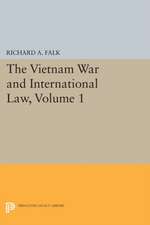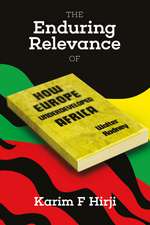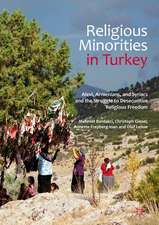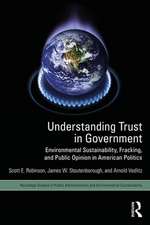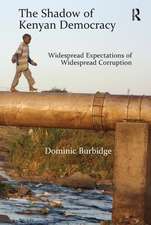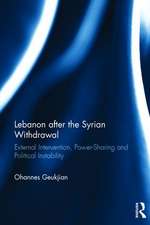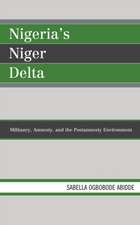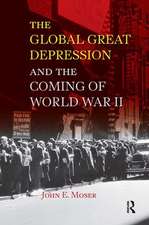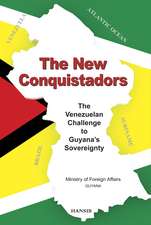From Peril to Partnership: US Security Assistance and the Bid to Stabilize Colombia and Mexico
Autor Paul J. Angeloen Limba Engleză Hardback – 19 iun 2024
Preț: 179.85 lei
Preț vechi: 203.54 lei
-12% Nou
Puncte Express: 270
Preț estimativ în valută:
34.41€ • 35.93$ • 28.42£
34.41€ • 35.93$ • 28.42£
Carte disponibilă
Livrare economică 14-20 martie
Livrare express 11-15 martie pentru 61.58 lei
Preluare comenzi: 021 569.72.76
Specificații
ISBN-13: 9780197688106
ISBN-10: 0197688101
Pagini: 440
Dimensiuni: 224 x 150 x 41 mm
Greutate: 0.73 kg
Editura: Oxford University Press
Colecția OUP USA
Locul publicării:New York, United States
ISBN-10: 0197688101
Pagini: 440
Dimensiuni: 224 x 150 x 41 mm
Greutate: 0.73 kg
Editura: Oxford University Press
Colecția OUP USA
Locul publicării:New York, United States
Recenzii
From Peril to Partnership is a bracing, unrivaled account of Washington's diplomatic relations with its most important Latin American partners. Paul J. Angelo masterfully tackles one of the most pressing foreign policy questions of our time: what should the United States do to strengthen returns on overseas security and defense investments? Following the collapse of Afghanistan's security forces, Angelo's constructive, pragmatic recommendations for tailoring US assistance, captured in lessons from Colombia and Mexico, will inspire much-needed reflection. Ukraine hangs in the balance. The stakes couldn't be higher. As Angelo correctly notes, the answers couldn't be clearer.
Paul J. Angelo's book is a groundbreaking study of one of the thorniest subjects in Latin America-US relations: security sector reform and cooperation. It stands out in his broader understanding of the complexity of US efforts to pursue the goals of enhancing the capabilities of the security forces, forging a broader strategic partnership, and building democratic accountability. Perhaps the key conclusion of Angelo's work, as drug-trafficking again becomes a challenge to the power of the state in both countries, is that success largely depends on buy-in from the host country and a deep understanding of local context by the donor government. This is a lesson that the United States has yet to fully absorb in its law enforcement cooperation policies around the globe.
Paul J. Angelo's groundbreaking comparative analysis of US security assistance in Colombia and Mexico helps uncover the conditions for successful stabilization policy, and it should inform US policy toward Latin America and across the globe. Angelo's extensive fieldwork also makes a masterful connection between effective security assistance and democratization. From Peril to Partnership should be required reading for scholars of democracy as well as for policymakers engaged in stabilization efforts.
Paul J. Angelo's detailed, skillfully-written analysis of US security and law enforcement assistance to Colombia and Mexico provides important lessons that policymakers need to read. Success or failure of such efforts, he argues, lie in the institutional and political disposition of the recipient country. More controversially, he argues, centralized security sectors and delivering assistance in ways that do not challenge existing balances of power in the recipient country are more likely to result in better reform outcomes. Yet democratization often embraces decentralization and demands power changes. Angelo's findings are thus deeply uncomfortable, yet all the more important. In shaking up the established beliefs of many long-time practitioners and academics, From Peril to Partnership deftly delivers a great contribution.
By comparing Plan Colombia and the Mérida Initiative, and through extensive field research in two key complex Latin American countries, Paul J. Angelo provides an overall assessment of US security assistance efforts in the region and draws lessons for the future. This was an extraordinary endeavor and is a must-read for all security experts in our hemisphere.
Having worked on security assistance for forty years, I can attest that too little time is spent understanding the panoply of internal factors that influence how such assistance lands in a recipient country. By examining two similar cases from the same region, Paul J. Angelo has provided a seminal work that should be studied by policymakers, lawmakers, and practitioners alike as they grapple with how to 'do' security assistance better. These are not theoretical lessons from the past but as the collapse of Afghanistan's security forces is contrasted with the firm hold of Ukraine's, go to the core of current policy challenges.
From Peril to Partnership provides a sharp analysis of why US security assistance succeeded better in Colombia than in Mexico. A scholar with first-hand experience in the policy making process, Paul J. Angelo shows how complex security challenges can still have effective and accountable solutions when the US leverages domestic conditions and brings local stakeholders to the table. Required reading for anyone interested in how security assistance can be done better and what to avoid.
This compelling, comparative monograph by Paul J. Angelo will emerge as the definitive study of US security assistance in Latin America. Through exhaustive primary source research, multiple personal interviews in Colombia, Mexico and the United States, Angelo's work offers innovative socio-historic insights for scholars, policy makers, and students of the region.
Books like this need to be written and published.
His book is a must read for security analysts and Latin Americanists.
Paul J. Angelo's book is a groundbreaking study of one of the thorniest subjects in Latin America-US relations: security sector reform and cooperation. It stands out in his broader understanding of the complexity of US efforts to pursue the goals of enhancing the capabilities of the security forces, forging a broader strategic partnership, and building democratic accountability. Perhaps the key conclusion of Angelo's work, as drug-trafficking again becomes a challenge to the power of the state in both countries, is that success largely depends on buy-in from the host country and a deep understanding of local context by the donor government. This is a lesson that the United States has yet to fully absorb in its law enforcement cooperation policies around the globe.
Paul J. Angelo's groundbreaking comparative analysis of US security assistance in Colombia and Mexico helps uncover the conditions for successful stabilization policy, and it should inform US policy toward Latin America and across the globe. Angelo's extensive fieldwork also makes a masterful connection between effective security assistance and democratization. From Peril to Partnership should be required reading for scholars of democracy as well as for policymakers engaged in stabilization efforts.
Paul J. Angelo's detailed, skillfully-written analysis of US security and law enforcement assistance to Colombia and Mexico provides important lessons that policymakers need to read. Success or failure of such efforts, he argues, lie in the institutional and political disposition of the recipient country. More controversially, he argues, centralized security sectors and delivering assistance in ways that do not challenge existing balances of power in the recipient country are more likely to result in better reform outcomes. Yet democratization often embraces decentralization and demands power changes. Angelo's findings are thus deeply uncomfortable, yet all the more important. In shaking up the established beliefs of many long-time practitioners and academics, From Peril to Partnership deftly delivers a great contribution.
By comparing Plan Colombia and the Mérida Initiative, and through extensive field research in two key complex Latin American countries, Paul J. Angelo provides an overall assessment of US security assistance efforts in the region and draws lessons for the future. This was an extraordinary endeavor and is a must-read for all security experts in our hemisphere.
Having worked on security assistance for forty years, I can attest that too little time is spent understanding the panoply of internal factors that influence how such assistance lands in a recipient country. By examining two similar cases from the same region, Paul J. Angelo has provided a seminal work that should be studied by policymakers, lawmakers, and practitioners alike as they grapple with how to 'do' security assistance better. These are not theoretical lessons from the past but as the collapse of Afghanistan's security forces is contrasted with the firm hold of Ukraine's, go to the core of current policy challenges.
From Peril to Partnership provides a sharp analysis of why US security assistance succeeded better in Colombia than in Mexico. A scholar with first-hand experience in the policy making process, Paul J. Angelo shows how complex security challenges can still have effective and accountable solutions when the US leverages domestic conditions and brings local stakeholders to the table. Required reading for anyone interested in how security assistance can be done better and what to avoid.
This compelling, comparative monograph by Paul J. Angelo will emerge as the definitive study of US security assistance in Latin America. Through exhaustive primary source research, multiple personal interviews in Colombia, Mexico and the United States, Angelo's work offers innovative socio-historic insights for scholars, policy makers, and students of the region.
Books like this need to be written and published.
His book is a must read for security analysts and Latin Americanists.
Notă biografică
Paul J. Angelo, PhD is the director of the William J. Perry Center for Hemispheric Defense Studies at the National Defense University. Previously, he worked at the Council on Foreign Relations as the fellow for Latin America studies. He serves as a foreign area officer in the US Navy Reserve and as a presidential appointee on the US Naval Academy Board of Visitors. Angelo holds a BS in political science from the US Naval Academy, an MPhil in Latin American studies from the University of Oxford, where he studied as a Rhodes Scholar, and a PhD in politics from University College London.




